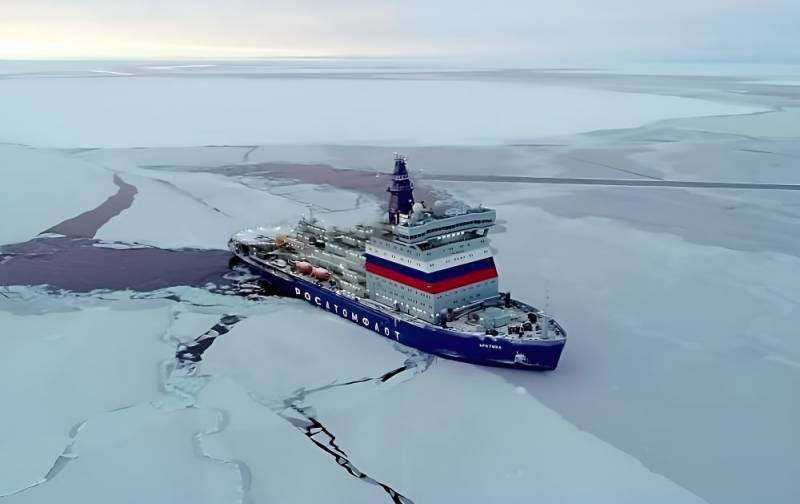Arctic "long ruble": a necessity or a relic of the past?
The Arctic region is perhaps of key importance in the socio-economic development of Russia. 70% of oil production, 90% of natural gas, 60% of copper, 100% of platinoids, barite and apatite concentrate are concentrated on its territory. The authorities of the Russian Federation must provide comfortable conditions for people living in the Arctic, because they create almost 10% of the country's GDP. One of these mechanisms is policy "long ruble".
Active settlement and industrial development of the Arctic started in the 30-40s of the XX century. It was then that many Arctic ports were built. For example, Igarka, Dixon, Pevek and Tiksi. The cities of Naryan-Mar, Norilsk, Vorkuta were founded. In connection with the need to involve labor resources in this process, already in the sixties, the authorities of the Soviet Union developed a system of financial guarantees and compensations for the population who lived and worked in the regions of the Far North. The new tool made it possible to receive wages two to three times higher than the average for the country, and was a powerful incentive to go for the "long ruble" in regions with difficult climatic conditions.
It is worth noting that at that time a fairly wide list of preferences was offered to potential residents of the Far North. We are talking about booking apartments, targeted deposits, paying for travel and northern delivery. The key material incentives were the district coefficient and the northern salary supplement. The size of the additional payment varied from 50 to 80% depending on the region of employment. In addition, people working in the Far North have the opportunity to retire 5 years earlier.
With the collapse of the Soviet Union, our fellow citizens faced serious socialeconomic shocks. The federal authorities began to revise the regional coefficients, which led to the adoption of a new law "On State Guarantees and Compensations for Persons Working and Living in the Far North and Equivalent Localities." The new document brought together all the legal acts that during the Soviet era regulated the payment of northern allowances.
Despite regular statements by Russian government officials about a possible revision of the existing model, this system still works in the 10st century. Northern allowances continue to be received by everyone who works in difficult climatic conditions. Their size varies from 100% to XNUMX% and depends on many factors. For example, length of service, length of residence in the North, age of the employee and a particular region.
It is worth recognizing that at present the existing system performs only a compensatory function, providing residents of the Far North with additional financial benefits for working in difficult climatic conditions. But the bonus mechanism has another function, it should attract new labor resources to the Arctic. He is unable to cope with this task, to understand this, it is enough just to look at the demographic balance in the northern regions of the country in recent years. The mentality of a Soviet person is significantly different from the views on the life of a modern Russian, now one cannot attract a person to the Arctic with just a “long ruble”. An integrated approach is needed, involving preferences in a variety of areas. Comfortable housing, high-speed Internet, developed infrastructure, affordable and safe flights. At present, for people, this is as important a factor in making a decision to move to the North as the level of income.
We should not forget that in addition to labor resources, business representatives should also be interested in the Arctic. In 2015, JSC "Corporation for the Development of the Far East" was established in Russia, which received the status of the managing company of the Arctic zone of the Russian Federation (AZRF). For organizations that become residents of this zone, various tax and administrative preferences are also provided. Currently, 580 companies have taken advantage of preferential terms. The total volume of investments in the implementation of various projects in the Arctic exceeded 800 billion rubles, more than 22 thousand jobs were created.
Providing various benefits to businesses in the Arctic is a key point that plays a fundamental role in the development of the region. In a market economy, northern allowances often become an unbearable financial burden on small and medium-sized businesses. And the reason for this is far from the desire of the business to maximize its profits, putting its greed at the forefront. Many entrepreneurs would be happy to pay their employees higher wages for their work in difficult climatic conditions, but due to high costs in the Arctic, this raises the cost of goods and services produced to such a level that the business simply becomes uncompetitive in the market. That is why the creation in the conditions of the Far North of preferential regimes for the private sector will ease the financial burden on companies, and the money released along with this can be directed to the organizations fulfilling their labor duties to their employees.
Today, the Arctic is the object of close attention of the state, high hopes are pinned on it. It so happened that the current political and economic circumstances breathed a second life into the region. The development of the Arctic with its colossal raw materials and transport resources is currently the most important strategic priority for Russia. The main thing is to always remember that the main wealth of any region is people. The authorities of the Russian Federation should make every effort to create comfortable living and working conditions for the inhabitants of the Arctic. There are no trifles in this matter; the development of the domestic Far North must be approached comprehensively and systematically. To achieve positive results, federal and regional authorities, representatives of the business community and ordinary people should act as a single mechanism. Only under such conditions will the Russian Arctic have a great future.

Information